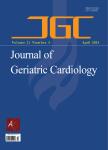Isoflavone genistein protects high glucose-induced human aortic endothelial cell apoptosis through estrogen receptor-mediated pathway
Isoflavone genistein protects high glucose-induced human aortic endothelial cell apoptosis through estrogen receptor-mediated pathway作者机构:Department of Geriatric EndocrinologyChinese PLA General Hospital Beijing100853China Department of Geriatric EndocrinologyChinese PLA General Hospital Beijing100853China Department of Geriatric EndocrinologyChinese PLA General Hospital Beijing100853China Department of Geriatric EndocrinologyChinese PLA General Hospital Beijing100853China
出 版 物:《Journal of Geriatric Cardiology》 (老年心脏病学杂志(英文版))
年 卷 期:2008年第5卷第2期
页 面:86-90页
核心收录:
主 题:phytoestrogen endothelial cell high glucose estrogen receptor apoptosis
摘 要:Objective The aim of this study was to determine if isoflavone genistien has protective effects against high glucose-induced cell apoptosis in human aortic endlthelial cells, and investigate the possible mechanism for this protection. Methods Human aortic endothelial cells subjected to normal (5mmol/L) or high glucose (25mmol/L) were treated with genistein at 0, 50, 100nmol/L. Parallel experiments were performed with 100nM 17b-estradiol, and also in the presence and absence of the pure anti-estrogen ICI-182,780 (100nmol/L). The effects on cell apoptotic DNA fragmentation were determined using cell death ELISA, and the effects on cellular proliferation were determined using tritiated thymidine incorporation assay. Estrogen receptor expression was detected by Taqman quantitative PCR. Results Genistein at 100nmol/L significantly reduced high glucose-induced DNA fragmentation, and reversed cell DNA synthesis inhibition (P 0.001) after 24 hours incubation. The effect of genistein was completely blocked by ICI-182,780 administration. Estrogen receptor beta, but not alpha was found to be expressed in these cells. Conclusion Isoflavone genistein shows protection against high glucose-induced cell damage through estrogen receptor beta, reducing apoptotic DNA damage and protecting from the inhibition of cell proliferation.



